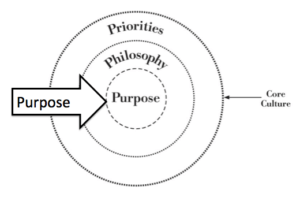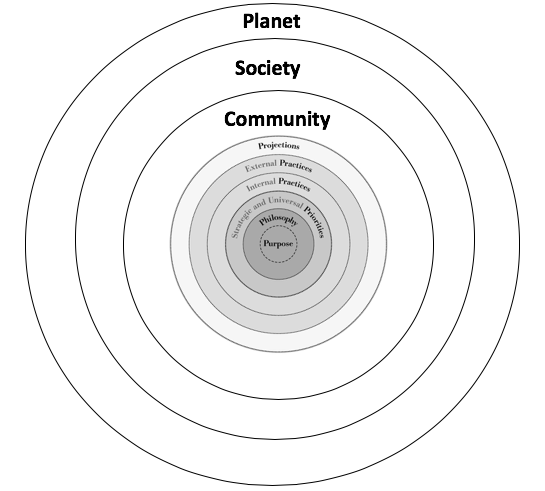Does your organization have a meaningful Purpose?
Each organization has a Purpose. Purpose is the fundamental reason why the organization exists. A meaningful Purpose states why the work there is important. A Purpose alone may not be distinctive. It is the Purpose and the Philosophy as a unit that constitute the organization’s distinctive organizational identity.
Leaders and employees must agree on the organization’s Purpose. And they must genuinely believe that Purpose is meaningful. If the Purpose does not resonate with employees, then you are missing a key contributor to employee engagement.
You see, a workplace needs to be more than just a place to go to work and get paid for one’s time and efforts. Employees must also feel that they can make a meaningful contribution in their lives through their work. People want their lives to matter. And when they see their work lives as a genuine source of meaningfulness, they feel more engaged and fulfilled.

Core culture is the central three Ps of the organization. It is the guiding principles and values of the organization. And Purpose is at the center of core culture. Defining and having a shared Purpose is fundamental to an organization because it is the basis for all aspects of the business.
Purpose is even more important today
Purpose becomes even more important when you view the world today and the challenges we face. Organizations are not isolated entities. Instead, they are part of communities, societies, and the planet. And thus, the broader focus on “making a difference” is a goal that is extended to achieving a better world.
This transition in perspective has changed over the years. Organizations initially only viewed their Purpose as to make money. Leaders believed that making money was why they were in business. And they believed employees would be motivated and engaged with this narrow view. Organizations need to make money to stay in business, and employees need to make money to support themselves and their families. But once a worker has sufficient money to live, that Purpose is no longer an adequate source of meaning.
Next, organizations viewed their Purpose from the perspective of their customers. If their contribution was making things better in some way for those they served, then that was a meaningful Purpose. But it did not take long to realize that Purpose is not just a contribution externally. It must also be a contribution for the people who work there.
So, for example, if improving health and well-being was an organization’s Purpose, something would be lacking if the company only sought to improve the health and well being of their customers. Employees cannot genuinely work each day to improve the health of “others” when the company neglects the health and well-being of its employees. Purpose grew in focus from just being customer focused to also being employee focused.
Expanded view of Purpose
But today, the view on Purpose has expanded further. The organization is not an isolated entity. It is more than a vehicle for serving employees and customers. It must also make a meaningful impact on the communities it serves, to the society at large, and even to the planet.

The organization with its Five Ps is embedded in the community, the society, and the planet. Therefore, actions of the organization require an even broader perspective than in the past. Organizations may not be able to make major impacts in all areas. But companies should make meaningful contributions in ways aligned with their Purpose.
We live in a tightly connected and shared world. If organizations don’t step back and see the bigger picture, they may miss out on having a truly impactful Purpose.
Contact Sheila to help you become a more Purpose-driven company
 Have any questions? Above all, contact Sheila. Her management consulting firm Workplace Culture Institute is based in Atlanta, serving clients globally. Use the Contact Form to email Sheila.
Have any questions? Above all, contact Sheila. Her management consulting firm Workplace Culture Institute is based in Atlanta, serving clients globally. Use the Contact Form to email Sheila.
This site uses Akismet to reduce spam. Learn how your comment data is processed.
Leave a Reply